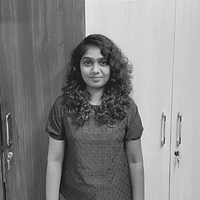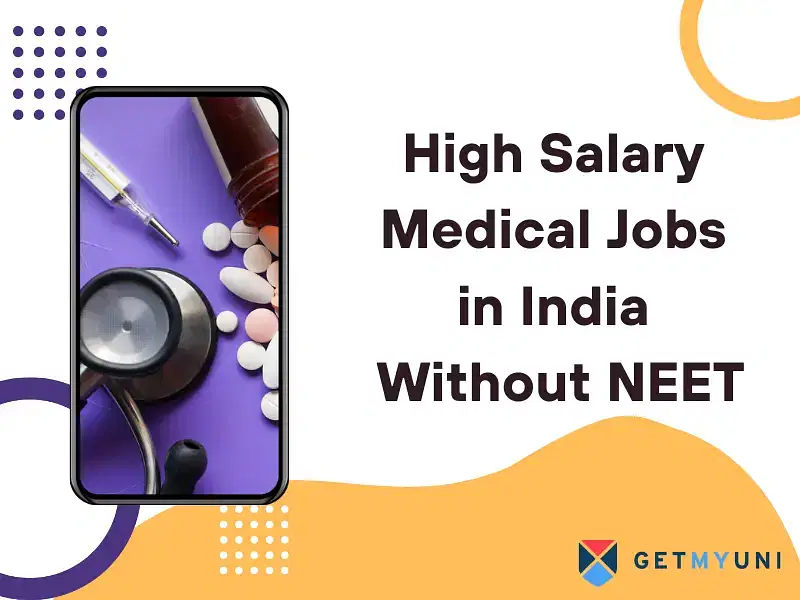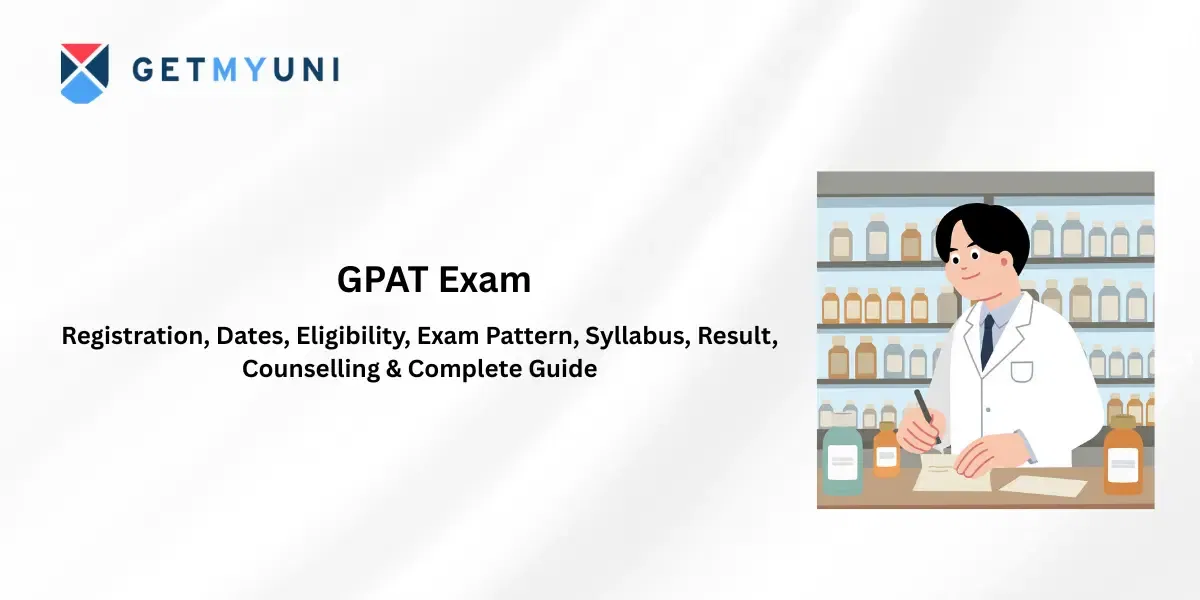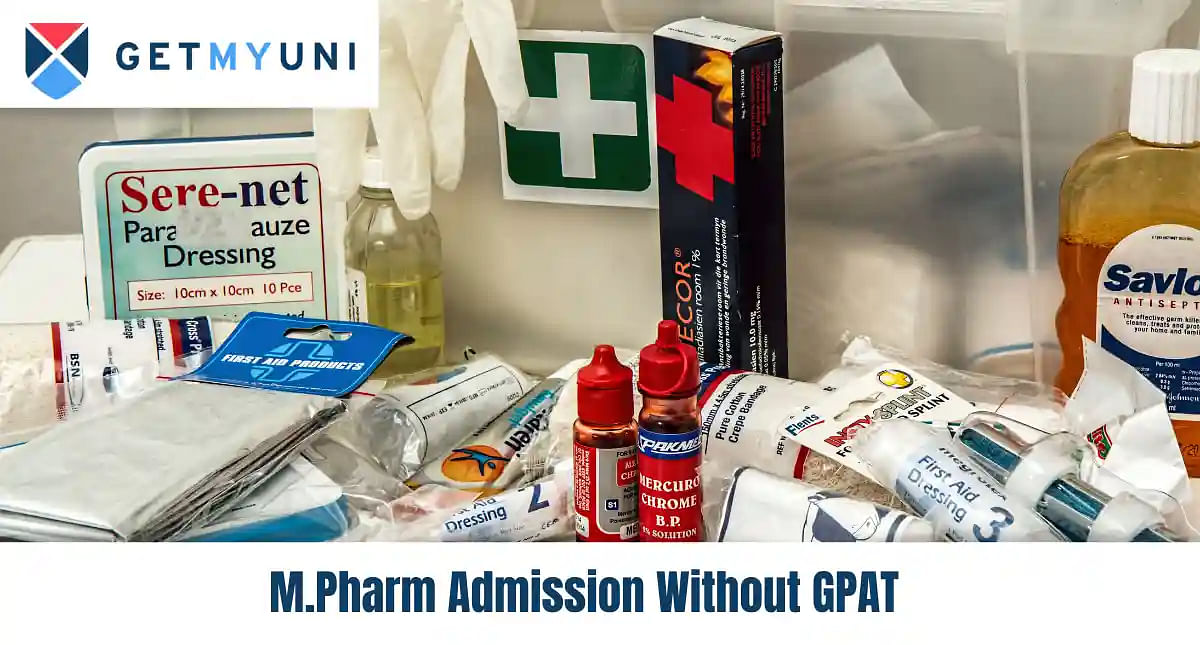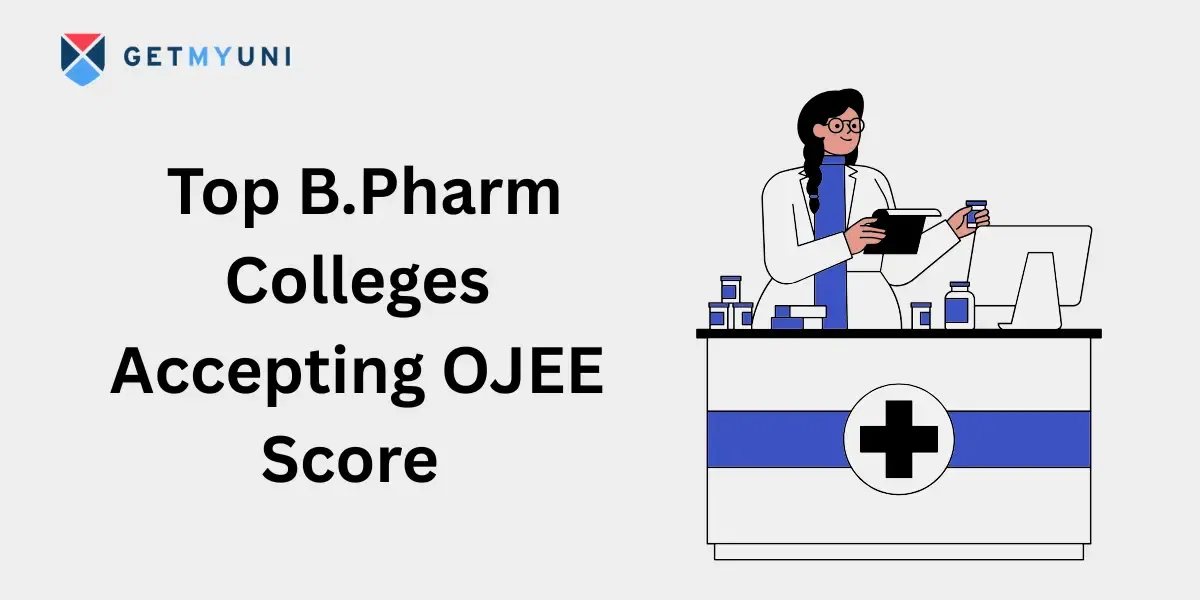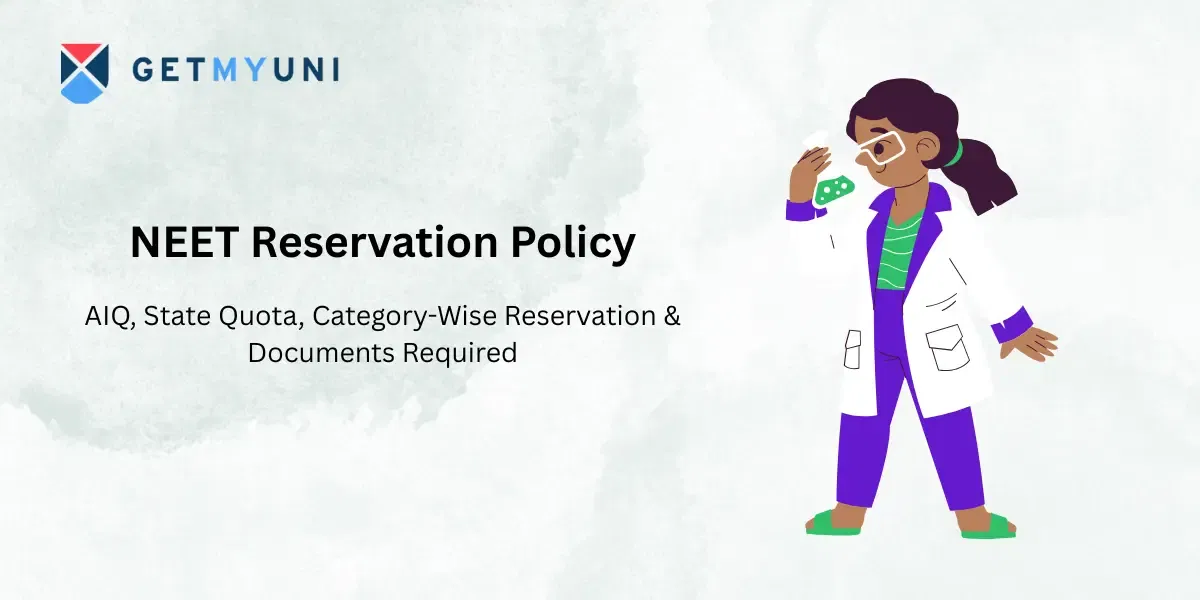Clearing NEET and understanding animals precisely are the main aspects of becoming a Veterinary Doctor in India. According to the VCI, there are 63,000 registered veterinarians in India.
How to become a Veterinary doctor? To become a veterinary doctor in India, applicants must finish their 10+2 degree in biology, chemistry, and physics and appear in NEET exam and clear the cutoff. The duration of Bachelor of Veterinary Science and Animal Husbandry (BVSc & AH) is 5.5 years and includes a required internship.
To practice lawfully after earning their degree, graduates need to register with the Veterinary Council of India (VCI).
A Master's (MVSc) or Ph.D. in veterinary sciences can be used to further specialize. Career options include positions in government agencies, animal husbandry, research, clinics, and wildlife conservation.
A veterinary doctor, also called a "vet" in short form, is a medical practitioner who treats, cures different types of disease in birds and animals.
Steps to Become a Veterinary Doctor in India
There are certain steps and guidelines to become a veterinary doctor in India. It all starts at an early age in a student's life when it comes to medical studies. Below listed are the following steps to become a Veterinary Doctor in India.
- Step 1: Meeting the basic criteria
- Step 2: Applying for NEET
- Step 3: Selecting the right course and college
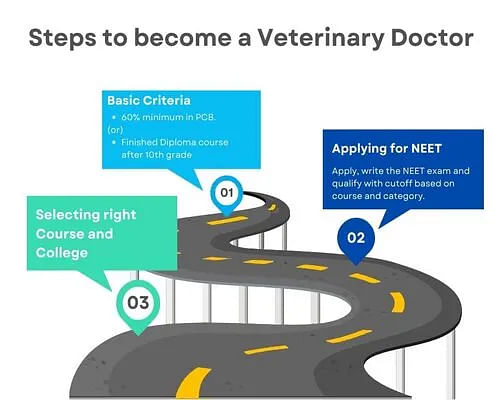
Step 1: Meeting the Basic Criteria
The basic criteria start with the selection of the right subjects from class 9. Science with Biology is a mandatory course to be followed in the school till class 12.
- A student must meet the demands of 60% in PCB (Physics, Chemistry, Biology) to be eligible to get admission to any recognized college offering veterinary courses.
- Students can also apply for diploma courses just after class 10.
Step 2: Applying for NEET
NEET stands for National Eligibility cum Entrance Test. It is the single entrance test conducted at the UG level for admission to medical courses.
- Students must apply and qualify for NEET after their class 12.
- After successfully qualifying the NEET exams, admission to MBBS, BDS, BAMS, BSMS, BUMS, BHMS, and BVSc & AH courses are granted to students.
- Now to become a Veterinary Doctor, a student may opt for BVSc or AH.
Step 3: Selecting the Right Course and College
A student must select BVSc or AH to become a Vet. BVSc stands for Bachelors of Veterinary Science. AH stands for Animal Husbandry, and it involves caring and rearing farm animals.
- Selection of the right college is as important as the right course.
- Many colleges are listed below, which provide different veterinary courses in UG and PG schemes.
- On successful completion of the course, a student can apply for a practitioner's license from the government and start practising as a Veterinary Doctor.
Skills Required to be a Veterinary Doctor
The veterinary doctors are required to serve the animals with tender care and support. They need to be surgically accurate, know about animal medicines, have proper knowledge of vaccines and diet.
The following list elaborates on the required skills:
- Clinical Competencies: Sound medical knowledge, theoretically and practically.
- A strong Background in Medical Science: A candidate must be from a Science background with Biology in order to pursue veterinary science.
- Diagnostic Competencies: Candidates must be able to handle Diagnostic tools and have the aptitude to understand animal responses.
- Laboratory Knowledge: Laboratory knowledge leads the way to practical knowledge and provides experience.
- Empathetic Nature: Must have soft skills to deal with animals and owners tenderly to reassure and support them.
- Sufficient Knowledge of Science: The basic instincts of science must be known in order to diagnose rare cases.
- Team Player: A candidate must be a team player coworking with Vet Surgeons and support staff.
- Keen to Learn and Adapt to Modern Practices: A true doctor must adapt to modern technology and medication and help society.
Types of Veterinary Doctors
The question of how to become a veterinary doctor is best answered when a candidate knows about the different fields offered in the specialist disciplines. The various disciplines are as follows, which discusses the types of Veterinary doctors.
- Companion Animal Veterinary Doctors
- Equine Veterinary Doctors
- Food Animals Veterinary Doctors
- Food Safety & Inspection Veterinary Doctors
- Research Veterinarians
1. Companion Animal Veterinary Doctors
These doctors treat pets, and they generally work in private clinics and hospitals. They mostly tend to the medical needs of cats and dogs, and they also treat pet birds, rabbits, etc.
These veterinary doctors diagnose diseases, provide treatment for health problems related to animals, advise owners about preventive health care, and carry out medical and surgical procedures.
2. Equine Veterinary Doctors
These types of veterinary doctors treat horses. Many stables which protect horses are prone to infections, and it spreads rapidly among horses.
Horses have special requirements for training and nutrition. Equine veterinary doctors specialize in this area and take care of the horses' medical needs.
3. Food Animals Veterinary Doctors
Food animal vet doctors are trained to treat farm animals such as poultry, pigs, cattle, and sheep. These doctors spend most of their time at farms and ranches and treating the animals.
They provide advice to farm owners and managers about feeding and general health issues.
4. Food Safety & Inspection Veterinary Doctors
Food Safety & Inspection Veterinary Doctors conduct inspections. They carry out tests on livestock and animal products for major animal diseases.
These doctors give out vaccines to treat animals and work for the betterment of animal welfare. For prevention and control of transmissible diseases, these veterinarians administer and design.
5. Research Veterinarians
Research Veterinarians conduct clinical research on animal health problems in laboratories. They perform tests on animals to identify the effects of drugs or test new surgical techniques that enhance the quality of surgeries being performed.
Some veterinary graduates become assistant professors at colleges and universities since they like to teach and spread knowledge.
Also Check: How to Become a Doctor?
Veterinary Courses in India
In order to become a Veterinary Doctor, the student should pursue an undergraduate degree - Bachelor's in Veterinary Science and Animal Husbandry.
There are many colleges and universities which provide the same. The student can also pursue a Master's degree in the same field.
The Veterinary Courses are broadly divided into the following four categories:
- Veterinary Course after 12th
- Veterinary Diploma Courses
- Masters in Veterinary Science
- PhD in Veterinary Science
Veterinary Course after 12th
Students searching for ways how to become a veterinary doctor after 12th? Must apply for a bachelor's degree after passing school. A minimum aggregate of 60% in PCB is necessary to be eligible for admission to any medical college offering Veterinary Courses.
The following are the B.V.Sc courses available in Veterinary Science to choose from after class 12:
- B.V.Sc (Animal Genetics & Breeding)
- B.V.Sc (Animal Production & Management)
- B.V.Sc (Veterinary Gynaecology & Obst.)
- B.V.Sc (Veterinary Parasitology)
- B.V.Sc (Veterinary Pathology)
- B.V.Sc (Veterinary Surgery & Radiology)
- B.V.Sc (Animal Nutrition)
- B.V.Sc (Veterinary Microbiology)
- B.V.Sc (Veterinary Medicine)
Veterinary Diploma Courses
Veterinary courses can also be pursued after class 10 in the form of a diploma degree. A Diploma degree can give more exposure to animal care and thus build a strong base of knowledge for the student.
The following are the Diploma Courses in Veterinary Science that are provided in India:
- Animal Husbandry Diploma Programme (AHDP)
- Diploma in Veterinary Science and Animal Health Technology
Masters in Veterinary Science
A Master's degree in Veterinary Science helps in acquiring more research and knowledge. A master's degree also ensures a better job and superior designations in the field of animal care.
The following are the Master's degree courses available in Veterinary Science to choose from after completion of UG courses:
- M.S. (Quality Systems in Dairy Processing)
- M.Sc. (Live Stock Production and Management)
- M.Sc. (Live Stock Production Technology)
- M.Sc (Veterinary Medicine)
- M.Sc. (Veterinary Public Health)
- M.V.Sc & A.H (Veterinary Science & Animal Husbandry)
- M.V.Sc. (Animal Biochemistry)
- M.V.Sc. (Animal Biotechnology)
- M.V.Sc. (Animal Statistics)
- M.V.Sc. (Animal Nutrition)
PhD in Veterinary Science
Students can also pursue higher education studies and do a PhD. A PhD in any Veterinary course helps research the development of improvised medicines, controlling disease and livestock breeding.
The following are the PhD degree courses available in Veterinary Science in India:
- PhD (Animal Husbandry Extension Education)
- PhD (Animal Nutrition)
- PhD (Animal Science)
- PhD (Veterinary Anatomy & Histology)
- PhD (Veterinary Extension Education)
- PhD (Veterinary Medicine)
- PhD (Veterinary Microbiology)
- PhD (Veterinary Parasitology)
- PhD (Veterinary Pathology)
- PhD (Veterinary Surgery & Radiology)
Veterinary Science Colleges in India
In India, the average intake capacity of each veterinary college is 60 students each, working out to a total of 3,300 a year. Around 2100 graduates are produced annually in the country.
Here is the list of top colleges to choose from for Veterinary Science in India, along with their average per semester fees.
| Veterinary Science Colleges | Average Semester Fees |
| Indian Veterinary Research Institute, Bareilly, Uttar Pradesh | INR 29,500 |
| Govind Ballabh Pant University of Agriculture and Technology, Pant Nagar, Uttarakhand | INR 57,000 |
| Veterinary College and Research Institute, Namakkal, Tamilnadu | INR 21,100 |
| College of Veterinary and Animal Science, Bikaner, Rajasthan | INR 15,900 |
| Orissa University of Agriculture and Technology, Bhubaneswar, Odisha | INR 21,800 |
| Kerala Veterinary and Animal Sciences University, Pookode, Wayanad | INR 28,900 |
| Anand Agricultural University - Anand, Gujarat | INR 13,000 |
| Bihar Agricultural University, Bhagalpur, Bihar | INR 12,500 |
| Karnataka Veterinary Animal and Fisheries Sciences University, Bidar, Karnataka | INR 5,00,000 |
| Sri Venkateswara Veterinary University, Tirupati, Andhra Pradesh | INR 32,000 |
Read More: Top Veterinary Colleges in India
Eligibility to Become a Veterinarian
To pursue a Bachelor's in Veterinary Science and Animal Husbandry (B.VSc), the student must have passed 10+2 in Physics, Chemistry, and Biology group. These students should attend the NEET exam conducted by NTA.
The required veterinary doctor qualifications are as mentioned below:
- If the student scores the required cut-off mark, then they will be able to pursue the degree.
- Students who want to pursue a Masters in Veterinary Science or Animal Husbandry must have completed a Bachelors in that particular field and should have a good percentage of marks.
- Each university has its own entrance exams, and the students have to score sufficient marks to get a seat in the Master's Programme.
Veterinarian Career Path
Graduates in Veterinary Science have many career opportunities in this field. With recent developments in Science and Technology, there is a rapid increase in pet ownership.
- The increased number of poultry farms and other livestock has proportionally increased the demand for veterinary doctors.
- Many dairy research units and large-scale dairy and poultry farms require the services of veterinary doctors.
- Veterinary doctors can work in private hospitals and government veterinary hospitals.
- Many top veterinarians who have PG degrees go into research fields, and some of them become academicians by becoming teachers or professors in colleges and universities.
Salary of Veterinary Doctor
The job of a veterinary doctor can be stressful, demanding, hectic, and physically challenging, with a risk of infections. Hence, private practitioners are more common due to higher pay.
Government Veterinary Doctors have a much more secure job with added benefits. A Veterinary Doctor earns depending upon location and position.
According to PayScale, the average salary of a Veterinarian in India is as follows:
| Sectors of Veterinary Doctors | Approximate Salary |
| Veterinarian in India | INR 5,05,652 LPA |
| Veterinary Doctors Working in the Private Sector | INR 15,000 to INR 20,000 (Monthly) |
| Veterinary Doctor Working in Government Sector | INR 30,000 to INR 50,000 (Monthly) |
Duties of Veterinary Doctor
A veterinary doctor has to be prepared to cure animals in need. The doctor must have expertise in all laboratory equipment and other technical instruments.
Further, a veterinary doctor should be extremely careful, especially while attending to aggressive animals. Here is the list of duties which has to be followed by a Veterinary Doctor
- The veterinary doctor is responsible for diagnosing animal health problems.
- They are responsible for carrying out vaccinations against diseases like rabies.
- They provide medication to animals that suffer from infections or illnesses.
- They are trained to treat and dress wounds and also set fractures.
- They are responsible for carrying out minor to complex surgeries depending upon the necessity.
- They provide advice to pet owners about animal feeding, behaviour, and breeding.
- They euthanize animals when it is necessary.
- The veterinarian provides preventive care to maintain the health of livestock.
- They also perform diagnostic tests such as X-rays, EKG, Ultrasound, and so on.
